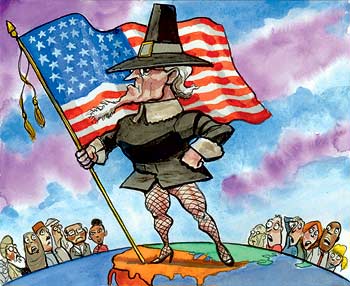skip to main |
skip to sidebar
 It requires a premium subscription to The Economist to read it all; but from the 25 FEB issue was one of the best descriptions about why the Europeans (and others) just don't understand the U.S. and its complexity, and therefore have no problem finding something to hate - if they try hard enough. I would love to hear Michael's opinion.
It requires a premium subscription to The Economist to read it all; but from the 25 FEB issue was one of the best descriptions about why the Europeans (and others) just don't understand the U.S. and its complexity, and therefore have no problem finding something to hate - if they try hard enough. I would love to hear Michael's opinion.Foreigners ... have oddly confused views of America as a land of “Puritans and pornographers”—and that confusion makes fighting anti-Americanism extremely difficult.
“Puritans and pornographers” is a caricature, of course. But provided you adopt a broad definition of both Puritanism and pornography—with Puritanism standing for religion and pornography standing for popular culture—it is not an absurd one. America is a strikingly effective producer of popular culture. It not only makes more of it than any other country; it also produces more in-your-face culture—loud mouthed, libidinous and impossible to ignore. Yet it also stands out from other developed countries when it comes to resisting secularisation. America is the only modern country where most people belong to a religious organisation and where some 90% believe in God.
Arguably, America's religiosity and its popular culture spring from the same commitment to free markets. Its churches, no less than its film studios, have thrived precisely because they have never been shackled to the state and thus have to compete for customers. But whatever their common roots, pornography and Puritanism produce very different sorts of anti-Americanism.
For many Euro-secularists, America's religiosity is its least attractive characteristic. They can't believe that any modern person can be religious unless they are either stupid (Britain's Private Eye dubs George Bush the leader of the “Latter Day Morons”) or insane (a former German chancellor was known to accuse Mr Bush of “hearing voices”). The Pew Research Centre's survey of global attitudes last year discovered that most French and Dutch, as well as pluralities of Britons and Germans, think America is too religious.
Yet many cultural conservatives dislike America for exactly the opposite reason—because it is a battering ram for popular culture.
...
What makes the “pornography” and the Puritanism so hard to take for foreigners is that America is so aggressive at exporting both of them. With pop culture, this is well documented. The perennial tedium of the Oscars ceremony won't prevent millions of people from watching it. But America is also a world-beater when it comes to exporting religion. Pentecostalism, which started off at a Bible college in Topeka, Kansas, in 1901, is now the world's fastest-growing religion, with 500m followers. There are more than 140,000 American missionaries around the world and American-style mega-churches are beginning to appear in Europe. Meanwhile, in Congress, evangelicals are taking the lead in shaping American policy on aid and human rights.
One way of looking at this is that Mr Hunter's culture wars are now going global. That is partly because the battles between pornographers and Puritans in America rivet outsiders: who could not fail to be interested in the Kansas attorney-general who wants to be informed whenever there is “compelling evidence” of sexual interaction involving teenagers in his state? But there is also a deeper reason: many other countries are having to grapple with the problems America has.
This may be most obvious in the developing world, where traditional societies will inevitably have to endure their own version of America's culture wars as they get richer. But secular Europe has also recently discovered that it has not “outgrown” religious conflict—whether it be Christians complaining about the blasphemous BBC or the continent's ever larger and more assertive Muslim population complaining about cartoons. As in so many other aspects of anti-Americanism, the schizophrenic fury against pornographers and Puritans is a twisted compliment; America is once again leading the way.
 It requires a premium subscription to The Economist to read it all; but from the 25 FEB issue was one of the best descriptions about why the Europeans (and others) just don't understand the U.S. and its complexity, and therefore have no problem finding something to hate - if they try hard enough. I would love to hear Michael's opinion.
It requires a premium subscription to The Economist to read it all; but from the 25 FEB issue was one of the best descriptions about why the Europeans (and others) just don't understand the U.S. and its complexity, and therefore have no problem finding something to hate - if they try hard enough. I would love to hear Michael's opinion.








No comments:
Post a Comment